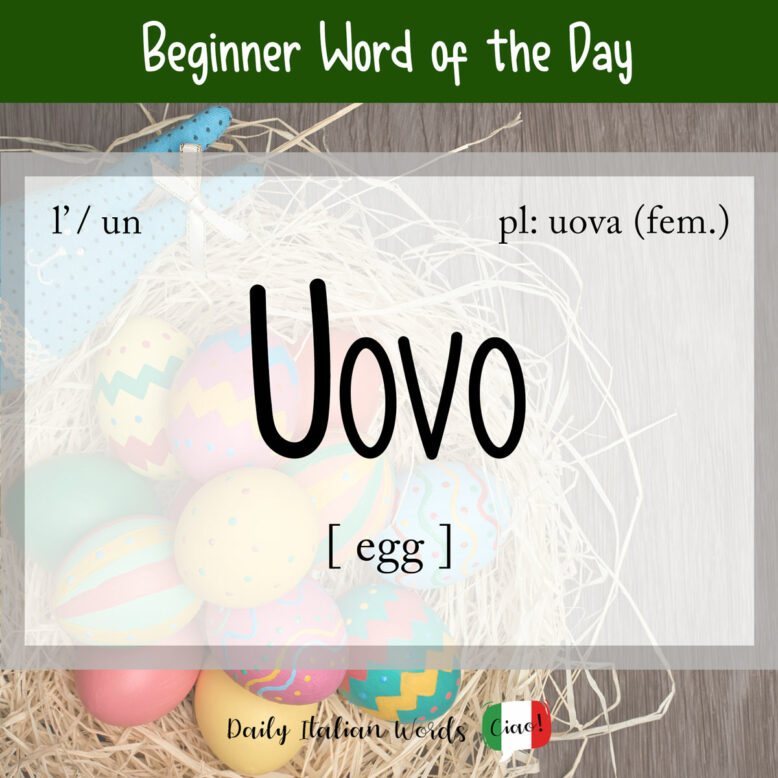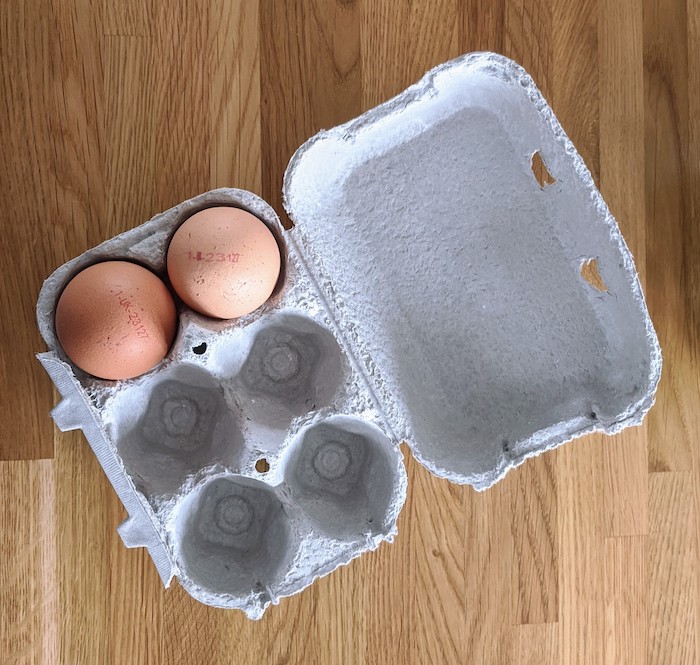Today’s word of the day is part of our Italian Easter Word series. Each day during the week leading up to Easter, we’ll post a word that is related to this special time of year. Enjoy! 🐰
The word for egg in Italian is uovo. In its singular form, it is a masculine noun ending in o (l’uovo, un uovo). In its plural form, the gender changes because it has an irregular plural: it becomes a feminine noun ending in the letter a (le uova, delle uova), and not the letter i (uovi*) as you might expect. This is because the word is derived from the old Latin neuter plural ova.
*Fun trivia: Some other weird and wonderful masculine nouns whose plural forms end in a include muro (plural: mura), dito (plural: dita), labbro (plural: labbra) and osso (plural: ossa). These nouns all go from being masculine in the singular to feminine in the plural, so il muro for example becomes le mura.

Learn with our video
The word uovo is used to refer to any kind of egg produced by birds, fish, reptiles, amphibians or insects. Just as in English, it also functions as an informal substitute for ovulo, which is the word for the egg cell or ovum of mammals.
La gallina ha deposto un uovo nel giardino.
The hen laid an egg in the garden.

People enjoy cooking and eating their eggs in a variety of ways. Some of the most popular egg dishes include:
- uovo alla coque = soft-boiled egg (this comes from the French “oeuf à la coque” where “coque” means shell)
- uovo sodo = hard-boiled egg
- uovo strapazzato = scrambled egg
- uovo all’occhio di bue = sunny-side-up egg (lit: ox eye egg)
- uovo in camicia = poached egg (lit: egg in a shirt)
- frittata = a kind of Italian omelette
- uovo sott’aceto = pickled egg
The inner part of the egg comprises two parts: il tuorlo d’uovo (egg yolk) which is also known as il rosso d’uovo (the red of the egg), and il bianco d’uovo (egg white) which also goes by the name of albume or chiara d’uovo (the clear part of the egg).
But there is one kind of egg that doesn’t have either, and that’s the uovo di Pasqua (Easter egg)!

The uovo di Pasqua (less frequently known as uovo pasquale) is a traditional Christian object that symbolises the resurrection of Jesus from the sepulchre. Although the chocolate egg (uovo di cioccolato) is a relatively new addition to the Easter festival, the practice of giving real eggs, decorated in different colours and designs, has been around since the Middle Ages. These dyed eggs are called uova sode colorate (lit: coloured boiled eggs) in Italian.
When referring specifically to Easter eggs or when talking to children about eggs, the diminutive term ovetto (lit: small egg) is often used instead of uovo.
Below are a few common terms you’ll come across while browsing through an Italian Easter egg catalogue!
- uovo di cioccolato fondente = dark chocolate egg
- uovo di cioccolato al latte = milk chocolate egg
- uovo nocciolato = hazelnut egg
- ovetti misti = mixed chocolate eggs
- ovetti confettati = little eggs coated with a layer of sugar, usually with a filling
- uovo decorato = decorated egg

Expressions with the word “uovo”
Meglio un uovo oggi che una gallina domani
Literal: better an egg today than a hen tomorrow
English equivalent: a bird in the hand is worth two in the bush
Cercare il pelo nell’uovo
Literal: to look for the hair in the egg
English equivalent: to split hairs
Rompere le uova nel paniere a qualcuno
Literal: to break the eggs in someone’s basket
English equivalent: to rain on someone’s parade
Essere pieno come un uovo
Literal: to be as full as an egg
Meaning: to be very full (when you eat too much)
La gallina dalle uova d’oro
Literal: the hen with golden eggs
English equivalent: the golden goose
One expression you may have heard before is Uovo di Colombo (Columbus’ Egg). It refers to a brilliant idea or discovery that seems simple or easy after the fact. According to the apocryphal story, Columbus challenges his critics to make an egg stand on its tip after being told that his discovery of America was no great accomplishment. When they fail, he does it himself by flattening the tip of the egg with a gentle tap.
This article is also available in video format on our YouTube channel. The audio version can be found on Podbean, Google Podcast, Apple Podcast and Spotify.
Heather Broster is a graduate with honours in linguistics from the University of Western Ontario. She is an aspiring polyglot, proficient in English and Italian, as well as Japanese, Welsh, and French to varying degrees of fluency. Originally from Toronto, Heather has resided in various countries, notably Italy for a period of six years. Her primary focus lies in the fields of language acquisition, education, and bilingual instruction.


